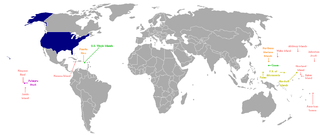United Nations Security Council Resolution 16, adopted on January 10, 1947, recognized the establishment of the Free Territory of Trieste, recording its approval of the three documents submitted.
United Nations Security Council Resolution 17, adopted on February 10, 1947, decided that the commission created by United Nations Security Council Resolution 15 was not empowered to request the governments of Greece, Albania, Bulgaria or Yugoslavia to postpone the executions of any of their political prisoners unless could give witness that would assist the commission in its task.
United Nations Security Council Resolution 18, adopted on February 13, 1947, created a Commission to try to give effect to United Nations General Assembly Resolution 41 which stated that regulation and reduction in world armaments and armed forces is an important measure for strengthening international peace.
United Nations Security Council Resolution 19, adopted on February 27, 1947, created a sub-committee of three members to examine all the facts involved in the dispute between the United Kingdom and Albania over the Corfu Channel incident and to make a report to the Council no later than March 10, 1947. Two British vessels were sunk by mines in the Straits on October 22, 1946.
United Nations Security Council Resolution 23, adopted on April 18, 1947, determined that the commission created by United Nations Security Council Resolution 15 would remain in the area and be enlarged.
United Nations Security Council Resolution 24, adopted on April 30, 1947, recommended Hungary's application for admission to the United Nations to the Committee on the Admission of New Members for "study and report to the Security Council at the appropriate time".
United Nations Security Council Resolution 25, adopted on May 22, 1947, recommended Italy's application for admission to the United Nations to the Committee on the Admission of New Members for "study and report to the Security Council at the appropriate time".
United Nations Security Council Resolution 26, adopted unanimously on June 4, 1947, modified the rules of procedure so that when the Council was voting to fill a position on the International Court of Justice, voting would continue as long as is needed until one candidate holds an absolute majority of the votes.
United Nations Security Council Resolution 27, adopted on August 1, 1947, called for the opposing Netherlands and Indonesian Republicans in the Indonesian National Revolution to lay down their arms and to allow a peaceful mediation of the conflict.
United Nations Security Council Resolution 30, adopted on August 25, 1947, upon having learning of the desire of both the Netherlands and Indonesian Nationalists in the Indonesian National Revolution to comply with United Nations Security Council Resolution 27, the Council requested that each of its members recall a diplomatic officer from Batavia to instruct them on the situation.
United Nations Security Council Resolution 32, adopted on August 26, 1947, condemned the continuing violence in the Indonesian National Revolution and asked both sides to own up to their commitments under United Nations Security Council Resolution 30.
United Nations Security Council Resolution 34, adopted on September 15, 1947, removed disputes between Greece and Albania, Yugoslavia and Bulgaria, from the Council's agenda.
United Nations Security Council Resolution 37, adopted on December 9, 1947, adapted the section of the rules of procedure for the Council governing the application for membership of new nations.

United Nations Security Council Resolution 83, adopted on June 27, 1950, determined that the attack on the Republic of Korea by forces from North Korea constituted a breach of the peace. The Council called for an immediate cessation of hostilities and for the authorities in North Korea to withdraw their armed forces to the 38th parallel. They also noted the report by the United Nations Commission on Korea that stated North Korea's failure to comply with Security Council Resolution 82 and that urgent military measures were required to restore international peace and security.
United Nations Security Council Resolution 88, adopted on November 8, 1950, in accordance with rule 39 of the provisional rules of procedure, the Council summoned a representative of the People's Republic of China to be present during the discussion by the Council of the special report of the United Nations Command in Korea.
United Nations Security Council Resolution 282, adopted on July 23, 1970, concerned by violations of the arms embargo passed against South Africa in Resolution 191, the Council reiterated its total opposition to the policies of apartheid and reaffirmed its previous resolutions on the topic. The Council called upon states to strengthen the arms embargo by ceasing the provision of military training to members of the South African armed forces and by taking appropriate action to give effective to the resolution's measures.

The Corfu Channel case was the first public international law case heard before the International Court of Justice (ICJ) between 1947 and 1949, concerning state responsibility for damages at sea, as well as the doctrine of innocent passage. A contentious case, it was the first of any type heard by the ICJ after its establishment in 1945.

United Nations Security Council resolution 683, adopted on 22 December 1990, after recalling Resolution 21 (1947) which approved the Trusteeship Territory of the Japanese Mandated Islands as well as Chapter XII of the United Nations Charter which established the United Nations Trusteeship system, the council determined that, in the light of entry into force of new status agreements for Federated States of Micronesia, the Marshall Islands and the Northern Mariana Islands, the objectives of the Trusteeship Agreement had been completed and therefore ended the Trusteeship Agreement with those entities.
The following lists events that happened during 1947 in the People's Republic of Albania.


